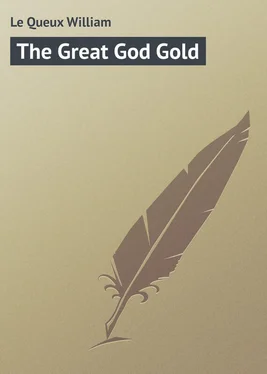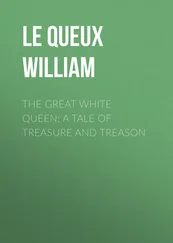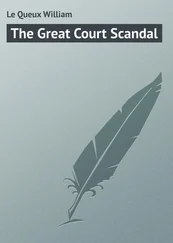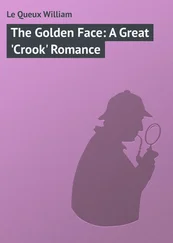William Le Queux - The Great God Gold
Здесь есть возможность читать онлайн «William Le Queux - The Great God Gold» — ознакомительный отрывок электронной книги совершенно бесплатно, а после прочтения отрывка купить полную версию. В некоторых случаях можно слушать аудио, скачать через торрент в формате fb2 и присутствует краткое содержание. Жанр: foreign_prose, на английском языке. Описание произведения, (предисловие) а так же отзывы посетителей доступны на портале библиотеки ЛибКат.
- Название:The Great God Gold
- Автор:
- Жанр:
- Год:неизвестен
- ISBN:нет данных
- Рейтинг книги:5 / 5. Голосов: 1
-
Избранное:Добавить в избранное
- Отзывы:
-
Ваша оценка:
- 100
- 1
- 2
- 3
- 4
- 5
The Great God Gold: краткое содержание, описание и аннотация
Предлагаем к чтению аннотацию, описание, краткое содержание или предисловие (зависит от того, что написал сам автор книги «The Great God Gold»). Если вы не нашли необходимую информацию о книге — напишите в комментариях, мы постараемся отыскать её.
The Great God Gold — читать онлайн ознакомительный отрывок
Ниже представлен текст книги, разбитый по страницам. Система сохранения места последней прочитанной страницы, позволяет с удобством читать онлайн бесплатно книгу «The Great God Gold», без необходимости каждый раз заново искать на чём Вы остановились. Поставьте закладку, и сможете в любой момент перейти на страницу, на которой закончили чтение.
Интервал:
Закладка:
The first which he placed with infinite care, touching it as lightly as possible, upon the Professor’s blotting-pad was the page already reproduced – the folio which referred to the studying of the “Mishna” and the cabalistic signs which the writer had apparently discovered therein.
The old man, blinking through his heavy round glasses, examined the disjointed words and unfinished lines, grunted once or twice in undisguised dissatisfaction, and placed the fragment aside.
“Well?” inquired Farquhar, eagerly, “does that convey anything to you?”
The Professor pursed his lips in quiet disbelief.
“The prologue of a very elegant piece of fiction,” he sneered. “The man who makes this statement ought certainly to have been a novelist.”
“Why?”
“Because of the clever manner in which he introduces his subject. But let us continue.”
With delicate fingers Frank Farquhar handled the next scrap of typewriting and placed it before the great expert.
The folio in question apparently attracted Professor Griffin much more than the first one presented to him. He read and re-read it, his grey face the whole time heavy and thoughtful. He was reconstructing the context in his own mind, and its reconstruction evidently caused him deep and very serious reflection.
A dozen times he re-read it, while Frank and Gwen stood by exchanging glances in silence.
“The first portion of the statement on this folio is quite plain,” remarked the Professor at last, looking up and blinking at the young man. “The writer indicates the Biblical fact that, after the Babylonian imprisonment the tablets of Moses were never again exhibited in the Temple. Surely this is not any amazing discovery! Every reader of the Old Testament is aware of that fact. The prophet Ezekiel himself was one of the temple priests deported to Babylon by Nebuchadnezzar in 597 B.C. You’ll find mention of it in Ezekiel, i, 2-8. His message consisted at first of denunciations of his countrymen, both in Babylon and in Palestine, but after the fall of Jerusalem in 586 B.C. he became a prophet of consolation, promising the eventual deliverance and restoration of the chosen people. Give me down the Bible, Gwen, dear, and also Skinner – the ‘Expositor’s Bible.’ You’ll see it in the second case – third shelf to the left.”
The girl crossed the room, and after a moment’s search returned with the two volumes, which she placed before her father.
“Nebuchadnezzar received certain vessels from the temple at Jerusalem. Well, we know that,” remarked the old man, as he opened the copy of Holy Writ and slowly turned its pages.
“The reference in the book of Ezra,” he said, referring to the open book before him, “concerns the proclamation of Cyrus, King of Persia, for the building of the temple in Jerusalem, how the people provided for the return, and how Cyrus restored the vessels of the temple to Sheshbazzar, the Prince of Judah.” Then, turning to Gwen, he said: “Read the verses referred to, dear – seventh to the eleventh in the first chapter.”
The girl bent over the Bible, and read the verses aloud as follows:
“Also Cyrus the King brought forth the vessels of the house of the Lord, which Nebuchadnezzar had brought forth out of Jerusalem, and had put them in the house of his gods;
“Even those did Cyrus King of Persia bring forth by the hand of Mithredath the treasurer, and numbered them unto Sheshbazzar, the Prince of Judah.
“And this is the number of them: thirty chargers of gold, a thousand chargers of silver, nine and twenty knives,
“Thirty basons of gold, silver basons of a second sort four hundred and ten, and other vessels a thousand.
“All the vessels of gold and silver were five thousand and four hundred. All these did Sheshbazzar bring up with them of the captivity that were brought up from Babylon unto Jerusalem.”
“Surely that is sufficient historical fact!” the old Professor said in his hard, “dry-as-dust” voice. “Again, farther on, there is, you see, a statement that Titus destroyed Jerusalem and that he built the Arch of Triumph in Rome and placed a representation of the candlesticks upon it. Does not every schoolboy know that! Bosh! my dear Frank!”
“True,” exclaimed Frank, “but see! in the next line but one is a reference to the existence of something in ‘the whole prophecy of Ezekiel’ – something in ‘black and white.’”
Professor Griffin shrugged his shoulders.
“Ezekiel develops the doctrine of individual responsibility and of the Messianic kingdom as no prophet before him,” was the Professor’s reply. “It may refer to that. The prophet’s style is not of the highest order, but is extraordinarily rich and striking in its imagery. The authenticity of the book is now admitted, all but universally, but the corrupt state of the Hebrew text has, for ages, been the despair of students. Cornhill, in 1886, made a brilliant attempt to reconstruct the Hebrew text with the aid of the Septuagint.”
Griffin noticed that his young friend did not quite follow that last remark, so he added:
“The Septuagint is, as you may perhaps know, the earliest Greek translation of the Old Testament scriptures made directly from the Hebrew original during the third century before Christ for the use of the Hellenistic Jews. In the literary forgery produced about the Christian era, known as the ‘Letter of Aristeas,’ and accepted as genuine by Josephus and others, it is alleged that the translation was made by seventy-two men at the command of Ptolemy II. You will find portions of it in the British Museum, and from it we find that the translation is not of uniform value or of the same style throughout. The Pentateuch and later historical books, as well as the Psalms, exhibit a very fair rendering of the original. The prophetical books, and more especially Ezekiel, show greater divergence from the Hebrew, while Proverbs frequently display loose paraphrase.”
“But is there anything in those typed lines which strikes you as unusually curious?” demanded young Farquhar, pointing to the smoked and charred fragment upon the blotting-pad.
The Professor was silent for a moment, his eyes fixed upon the disjointed and unfinished sentences.
“Well – yes. There is something,” was his answer. “That statement that something exists in ‘the whole prophecy of Ezekiel.’ What is that something?”
“Is it what Doctor Diamond suspects it to be, do you think?”
“I can form no definite conclusion until I have investigated the whole,” was the great scholar’s response. “But I would, at this point, withdraw my own light remarks of half an hour ago. There may be something of interest in it, but what the picturesque story is all leading up to I cannot quite imagine.”
“To a secret – to the solution of a great and undreamed-of mystery!” declared Frank excitedly.
“The last few lines of this scrap before me certainly leads towards that supposition,” was the answer of Gwen Griffin’s father.
“Then you do not altogether negative Diamond’s theory that there is here, if we can only supply the context, the key to the greatest secret this world has ever known!”
“Ah! that is saying a good deal,” was the reply. “Let me continue the investigation of this wonderful document which the dying man was so anxious to destroy.”
And by the sphinx-like expression upon the old man’s face it was apparent that he had already gathered more information than he was willing to admit.
The truth was that the theory he had already formed within his own mind held him bewildered. His thin fingers trembled as he touched the dried, crinkled folio.
There was a secret there – without a doubt, colossal and astounding – one of which even the greatest scholars in Europe through all the ages had never dreamed!
Читать дальшеИнтервал:
Закладка:
Похожие книги на «The Great God Gold»
Представляем Вашему вниманию похожие книги на «The Great God Gold» списком для выбора. Мы отобрали схожую по названию и смыслу литературу в надежде предоставить читателям больше вариантов отыскать новые, интересные, ещё непрочитанные произведения.
Обсуждение, отзывы о книге «The Great God Gold» и просто собственные мнения читателей. Оставьте ваши комментарии, напишите, что Вы думаете о произведении, его смысле или главных героях. Укажите что конкретно понравилось, а что нет, и почему Вы так считаете.












